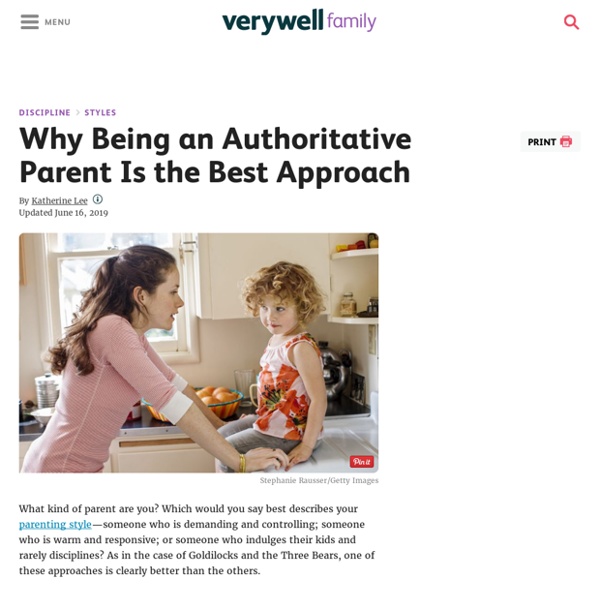Why Parenting Styles Matter When Raising Children
Developmental psychologists have long been interested in how parents affect child development. However, finding actual cause-and-effect links between specific actions of parents and later behavior of children is very difficult. Some children raised in dramatically different environments can later grow up to have remarkably similar personalities. Conversely, children who share a home and are raised in the same environment can grow up to have very different personalities.
Immigration: Acculturation and parenting
Subject Over 200 million individuals worldwide are international migrants. Immigration involves a displacement with significant effects on family life, not least because of the cultural shifts inherent in resettlement. An emergent body of research is focused on the implications of immigration and acculturation for parenting.
Smaller families in Singapore, leading to unhealthy parenting styles
SINGAPORE: It really didn’t seem that long ago when the Stop at Two campaign was in full swing, warning parents in Singapore that “the more you have, the less they (each) get”. Yet, the challenge today isn’t to discourage families from having many children, but to coax or even cajole young Singaporeans to get married earlier and have them. Compared to a few decades before, family sizes are shrinking as new parents tend to have less children.
5 Ways Millennials Are Changing Parenting Forever
Millennial parents, the cohort born between 1980 and 2000 of which there are an estimated 22 million of in the U.S., are astutely tailoring their parenting style to the needs of their family while challenging traditional societal norms. Shaped by an era dominated by post 9/11 security concerns, international conflicts, and a massive global recession, millennials have channelled a climate of uncertainty into a commitment to providing their kids with the best possible childhood. Here are five ways millennial parents are changing parenthood forever.
Is the Authoritative Parenting Style Always the Best for Children? - hybrid parenting
Today, the authoritative parenting style is perceived as the golden standard for appropriate parent-chid interactions. However, in many cultures, parents may have an authoritarian approach because they want to raise their children within the culture of respect. They may prioritize different socialization goals, such as respect over emotional closeness with their children. This was true in my family-of-origin; however, today, I am using the authoritative approach with my children.
Authoritarian and Authoritative Parenting Styles: Which Is Best?
People have their own unique style when it comes to parenting. It is not just about a set of rules; the style of parenting caregivers take on is a reflection of who they are, their culture, and their value systems. It’s important that parents be able to adapt their parenting style to integrate the best practices of other styles. This article will focus on two styles in particular: authoritarian and authoritative.
Authoritarian parenting: What happens to the kids?
Photo by CEphoto, Uwe Aranas © 2010-2017 Gwen Dewar, Ph.D., all rights reserved The authoritarian parenting style is about being strict and stern. It insists on unquestioning obedience, and enforces good behavior through threats, shaming, and other punishments. As defined by psychologists, it's also a style associated with less parental warmth and responsiveness (Baumrind 1991). That doesn't bode well for a child's health outcomes, especially if she's growing up in an otherwise stressful environment.
How does Culture Affect Parenting Styles?
Disclaimer: This work has been submitted by a student. This is not an example of the work produced by our Essay Writing Service. You can view samples of our professional work here.
Understanding Parenting Styles Can Help You Prepare Your Child for Life
Every parent wants to be the best parent they can be and desires their children to be happy and successful in life. You may not believe it, but our children want to please us and desire our approval, even if sometimes they act like they don’t care! They are looking to us to affirm that they are the greatest children! So this is our window of opportunity to build that incredible bond with our children that would hopefully last for life. We will all make mistakes as parents, but let’s try not to fumble too much if we can help it. An important starting point is self-awareness — learning what kind of parent you are and why you parent the way you do will help you parent more effectively and avoid hurting your child in the process.
Effects of Permissive Parenting on a Child - Parenting Everyday
There is no an ultimate parenting style that is ideal. It is the desire of every parent to raise a happy and healthy child. There are different parenting styles available but some of the parenting styles might not be ideal for parenting your children. In this article, we will be focusing on permissive parenting. There is so much discussion about this parenting style. Some people consider this parenting style to be great while others consider it to be a bad parenting style.
Parenting styles: An evidence-based guide
Parenting styles: An evidence-based guide © 2010-2018 Gwen Dewar, Ph.D., all rights reserved The concept of parenting styles was first introduced by Diane Baumrind to explain differences in the way parents attempt to control and socialize their children. Do parents show lots of affection, or remain aloof?
Many Singaporeans’ parenting style not helping children succeed - TODAYonline
I was disturbed to read the report “MP proposes piloting cluster of schools without exams, streaming” (Jan 22). In the current debate on how best to restructure the education system, more people seem inclined to wash the outside of a dirty cup and call it clean, but leaving the inside filthy as ever. An examination-free education system would serve only to mask the inadequacies of the current generation of pupils, rather than help them to succeed.



